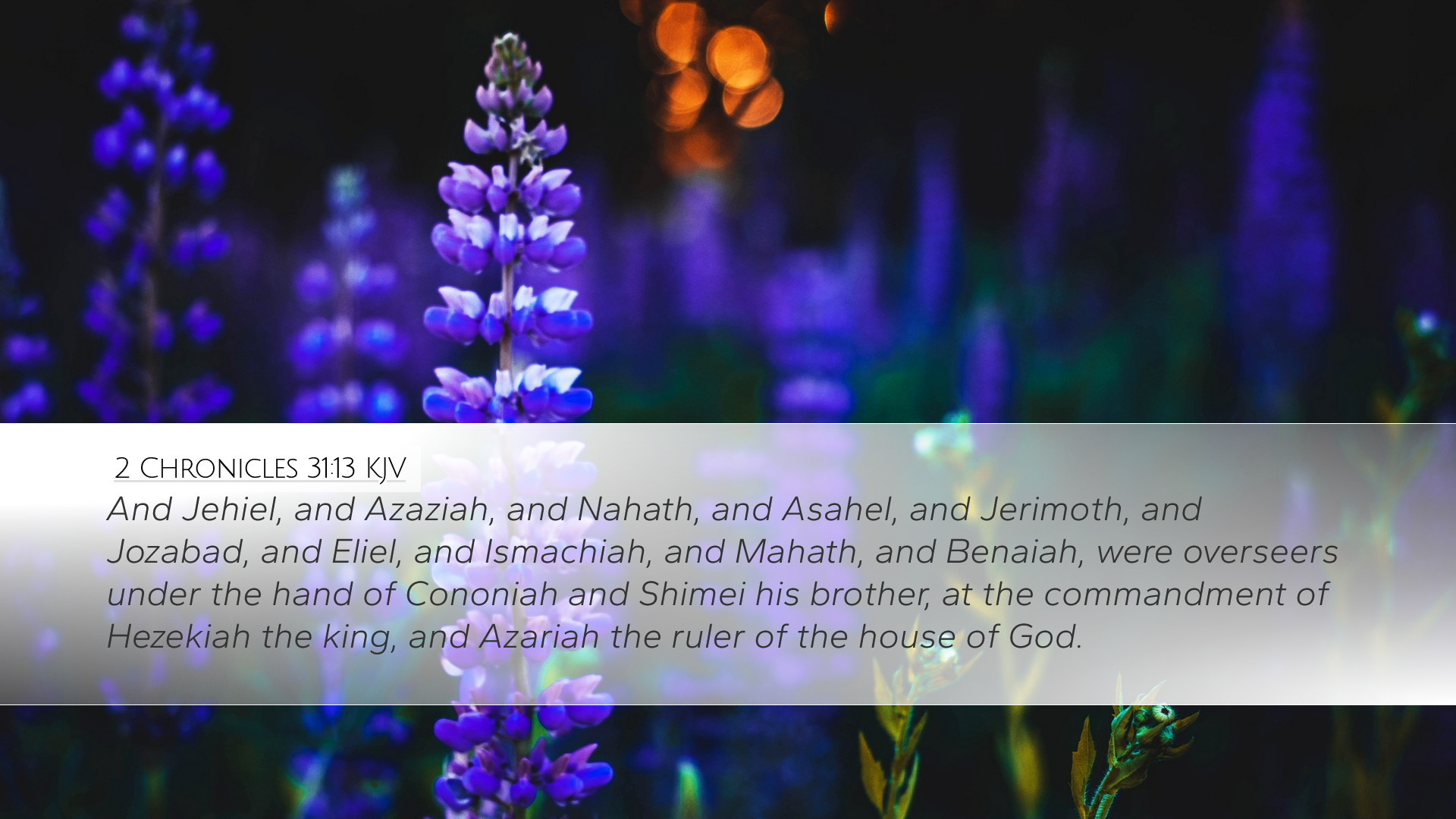2 Chronicles 31:13 Commentary
Verse Reference: 2 Chronicles 31:13
This verse occurs within the broader context of King Hezekiah's religious reforms in Judah, where he restores worship and prepares for the Passover and other sacrificial observances. It highlights the roles of the Levites and their responsibilities in the temple service.
Contextual Overview
Hezekiah, as noted in earlier chapters, was a king who sought to bring Judah back to the worship of Yahweh after a long period of idolatry and neglect of true worship. His reforms included cleansing the temple, reinstating proper worship, and encouraging the people to return to the observance of the law.
Key Elements of the Commentary
-
The Role of the Levites:
Hezekiah’s attention toward the Levites reflects the necessity of proper priestly conduct and their critical role in temple worship. The Levites are affirmed in their duties, suggesting a restoration of traditional roles that had been neglected.
-
Organization of Worship:
This verse signifies the organization initiated by Hezekiah, which denotes a systematic approach to worship, enhancing the spiritual climate and ensuring adherence to God's commandments. The decision to appoint leaders among the Levites demonstrates a commitment to accountability and order in the worship practices.
-
The Significance of Offerings:
In the context of Hezekiah’s reforms, the offerings signify a restoration of covenantal faithfulness. The people's willingness to present offerings reflects their renewed commitment to Yahweh and acknowledgment of His provision.
-
Restoration Movement:
This chapter reveals a significant revival in the land, with Hezekiah's moves echoing the prophetic calls for return to true worship found in the earlier texts of the Old Testament. It serves as an example of how leadership can catalyze spiritual renewal in a community.
-
Contrast with Previous Kings:
Contrasting Hezekiah's reforms with those of previous kings, especially Ahaz, serves to highlight the significance of righteousness in leadership and its direct impact on the people’s obedience to God.
Insights from Commentary Authors
-
Matthew Henry:
Henry emphasizes the importance of reform in worship and how Hezekiah’s actions were pivotal in returning the heart of Israel back to God. He notes that the care for sacred things is indicative of a renewed covenant attitude, both among leaders and the people.
-
Albert Barnes:
Barnes highlights the organizational aspect of Hezekiah’s reign and underlines the principle of delegation within ministry. He notes the wisdom in having structures in place to effectively manage the worship practices and offerings, aligning with God’s statutes.
-
Adam Clarke:
Clarke views the commitment of offerings by the people as a measure of their spiritual state. He also interprets the roles assigned to the Levites as indicative of God’s order, aiming for not only participation but also a deeper realization of their responsibilities before God.
Theological Implications
This verse and its surrounding context offer rich theological insights:
-
The Nature of Worship:
This passage teaches that worship is not merely an act of ritual but is intertwined with the community's ethical and spiritual life. True worship involves a collective heart directed towards God.
-
Leadership and Spiritual Renewal:
Hezekiah’s leadership exemplifies how transformative change can arise through godly leaders, whose influence leads to communal obedience to God's commands.
-
Covenantal Community:
The emphasis on offerings points to the idea of covenantal relationships between God and His people. These offerings symbolize trust in God’s provision and fidelity to His laws.
Application for Today's Church
In understanding 2 Chronicles 31:13, today's pastors, students, and theologians can draw several meaningful applications:
-
Restorative Leadership:
It is vital for leaders to guide their congregations towards a healthy worship life, emphasizing both personal holiness and public worship integrity.
-
Community Involvement:
Encouraging the community to actively participate in worship and offerings is indicative of a vibrant faith. The church should foster an environment that allows for such involvement.
-
Structured Worship Practices:
Understanding the value of organization within church practices can enhance worship authenticity and can lead to a more profound spiritual experience for all congregants.


